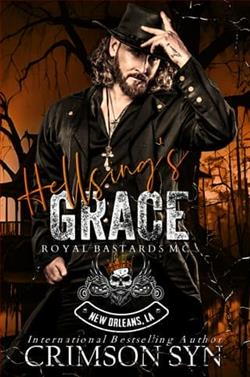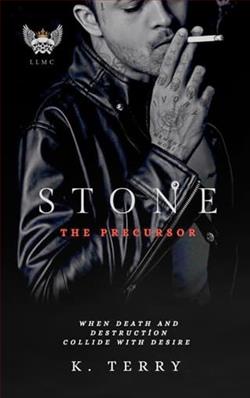Page 53 of Taming the Highland Misfits
Finley chose to ignore it; it was enough that he had forced the disgusting creature to acknowledge his crimes. He could not coerce him into repentance. “Of course, ye are sorry—or at least ye have said the right words,” he said scathingly, putting an arm around Isla’s shoulders. “Because ye were caught. Ye would never have said sorry otherwise.”
“What more do you want from me?” Robert Thomson asked, glowering at Finley. “You wanted an apology. I gave you one. Do you want gold? You can have every last penny I have, but there is not much.”
Finley stepped up to the other man, so close that their noses were almost touching, and said: “Isla will have your gold too, but she needs somethin’ else.”
Isla looked at Finley, puzzled. What was he talking about? “Finley?” she asked, but he put a hand up to tell her to be quiet.
“She needs this house,” Finley went on. “Ye see, Thomson, I know this woman—much better than you do, it seems—an’ she needs a place she can stay after you are gone—a place wi’ good memories o’ her mother in it, an’ a place where she can make more good memories o’ her own. I dinnae think a swine like you would understand that, though. So what dae ye say tae that?”
“I say,” Thomson replied, smiling at him smugly, “only one thing; that women are not allowed to own property because they do not have the intelligence to manage it properly. That responsibility is only given to men, so I’m afraid that will be impossible.”
For a moment, Finley looked disconcerted, then he spoke grimly.
“Then we will have tae find a way tae make it possible.” He pointed to a spot right in the farthest corner of the room. “Sit down there,” he ordered.
Thomson hesitated for a moment, then threw himself towards Finley, hoping to topple him over. Finley’s reflexes were too fast, however. He caught Thomson by the front of his jacket and pushed him forcefully into the corner. His back hit the wall and he slid down it until his backside hit the floor. Finley glared at him threateningly then he and Isla sat down at the other end of the table and talked in low voices.
“What should we do?” he asked, frowning. “The law is on his side this time, Isla.”
Isla thought for a moment, looking up into the face that was so dear to her. She could see that he was worried about her; no doubt if her father was sent to prison or executed she would still be allowed to stay here, but her future would be uncertain.
“I have an idea,” she answered thoughtfully. “I have an uncle—my mother’s only brother, Campbell McMillan. He is a good man and was fiercely opposed to my mother marrying my father. In fact, he did everything he could to stop it, but in the end, he could not. If we could get my father to sign the house, its contents and surrounding land over to him, he will make sure I am taken care of, and my aunts, my mother’s sisters, will also rally round. My father has been keeping us all apart for years.”
“An’ you are sure they are trustworthy?” Finley asked warily.
Isla nodded. “Yes,” she replied firmly. “My mother’s family are good, charitable people. That was the problem; my grandfather was too trusting. Because of some bad investments, he was in a great deal of debt, and my father was able to rescue him from it, which is the only good thing he ever did.
He made himself out to be a good, hardworking and affectionate man, but he soon showed his true colours once they were married. Of course, by then it was too late.”
She shrugged. “Anyway, that is all in the past. I think my Uncle Campbell is our best hope, but we must first make my father sign the documents.”
Finley smiled at her. It was an expression of relish, as if he was going to enjoy what he had to do next. “Dinnae worry about that, hen,” he said with unholy glee. “I will take care o’ that.”
He stood up and went over to Thomson, then pulled him upright by the front of his jacket so that they were once more face to face. “Where are the deeds tae the house?” he demanded, holding the knife under his nose.
“In my study,” the other man replied, swallowing nervously.
“I will fetch them,” Isla volunteered. “Nobody will touch me, and I know where he keeps a dagger.”
“Good,” Finley said, grinning.
Isla went out, and Finley locked the door behind her, then turned to his enemy and ordered him to sit down again, then a duel of wills began, with the two men staring at each other. The loser would be the one who looked away first.
It lasted less than a minute, as Robert Thomson dropped his gaze to the floor and let it rest there, since Finley McGill’s piercing gaze seemed to be boring into his mind and reading his thoughts. He felt no guilt, only a boiling anger that he had been forced to admit his crimes, and a burning hatred for the man who stood in front of him, gloating over his downfall.
* * *
Isla’s father’s study was a part of the house she had rarely had occasion to visit during all the years she had lived in it. As soon as she entered, however, a shiver began to creep over her flesh; she could feel his presence, even smell him in the air. She shuddered, remembering the day she had found her father’s dagger.
Isla had been ten years old at the time, and her mother had only been dead for a few months. She had seen her father leaving the study wearing his outdoor clothes and looking furiously angry, as he often did. This did not alarm her unless the anger was being directed at her, however.
She had seen that in his haste Robert Thomson had slammed the door behind him without shutting it properly, and overcome by curiosity, she had tiptoed inside to look around. The room had an oppressive feel, decorated as it was with ebony furniture and carpeted with deep brown rugs; the windows were hung with dark green curtains, the walls painted a dull grey-green. No paintings or ornaments of any kind relieved the drabness of the room. It was a miserable place.
Her father’s desk had proved to be as lacking in interest as the décor, and she was just about to close the bottom drawer and leave when she caught sight of the most important letter she would ever see. It was written in language too complicated for her to understand, but she knew enough to know that it was very important, and it was only later that she realised what it was: the deeds to the house she was standing in.
She had closed the drawer carefully, then received her second shock of the day. Underneath a pile of papers on the desk she had seen a gleam of bright metal, and had reached in to grasp the object of her attention, only to draw her hand back with a gasp as a stab of pain assailed her. A bead of blood blossomed on her finger, and she sucked it off, then cautiously removed the object from underneath the papers.
It was a knife, the kind she had seen the guards wear, and she found out later that it was called a dagger. Its blade was about nine inches long, and it sported a carved and polished wooden handle; indeed, it was a thing of beauty, but deadly, and she knew it. The light gleamed on the edge of a blade sharp enough to kill.















